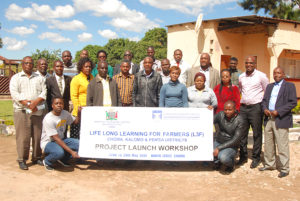 The L3F model was launched in Zambia in May 2018 with a capacity-building workshop for 25 extension officers from Zambia’s Ministry of Fisheries and Livestock. The workshop aimed to equip these officers with the requisite skills for using ODL technologies in farmer extension through the L3F model.
The L3F model was launched in Zambia in May 2018 with a capacity-building workshop for 25 extension officers from Zambia’s Ministry of Fisheries and Livestock. The workshop aimed to equip these officers with the requisite skills for using ODL technologies in farmer extension through the L3F model.
COL is working with the Ministry of Fisheries and Livestock to engage and leverage ongoing initiatives by other organisations, with the goals of (i) increasing the participation of more marginalised communities and disadvantaged people in lifelong learning using ICT and (ii) strengthening M&E.
Five ministry staff involved in M&E work under the Enhanced Smallholder Livestock Investment Programme — which is supported by the UN’s International Fund for Agricultural Development — have been trained in using ICT to digitise data collection forms and reporting. Other training workshops for district-level extension staff have been conducted in the Southern, Western and Eastern provinces. The Ministry of Fisheries and Livestock has adopted the L3F extension approach at the national level, working alongside the Enhanced Smallholder Livestock Investment Programme (ESLIP).
A total of 134 extension staff from the ministry were trained in facilitating mobile learning using the L3F extension approach. An L3F sensitisation workshop was held in February 2020, where the m-LAIS learning platform was presented to 30 participants from different organisations and directorates. COL and the partners from Uganda, where the platform originated, played a role in introducing it in Zambia. As of June 2020, there were 24,502 m-LAIS-registered farmers (13,912 male and 10,590 female). The L3F model has now been adopted in all ten provinces of Zambia, with the support of the Ministry of Agriculture.


